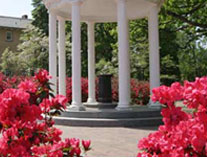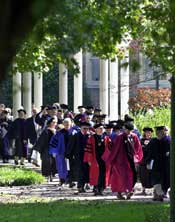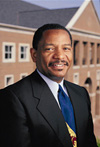 |
 |
||||||||||||||
|
|
|
|
|
|
|
||||||||||
 |
|||||||||||||||
|
|
To meet supplier deadlines, regalia rental orders should be received no later than September 20. For more information, please contact Eve Bradshaw at 962-2427 or email ebradsha@email.unc.edu >> top of page ParkingThe Swain lot will be reserved for platform party members and special guests.If you have any questions about parking, please contact Jane Smith
at jane_smith@unc.edu Distinguished Alumna/Alumnus Award CitationsElson Sylvester FloydElson Floyd, Class of 1978, grew up in Henderson, North Carolina, the eldest of three sons of working-class parents who were determined to give their children the best head start in life that they could achieve. As an undergraduate, Floyd served as student attorney general and won the John Johnston Parker Jr. Medal for Unique Leadership in Student Government. Floyd had intended to enter law school and become a university attorney, but the need to help his brothers through school led him to accept a position in the dean of student’s office as assistant dean for student life and judicial programs officer. Then, he received a fellowship to work on a Ph.D. in higher and adult education. A succession of appointments in the Carolina administration followed. Elson Floyd was on the way to success in his goal of service to higher education, but it was to be as an extremely talented academic executive, not the lowly lawyer he had once aspired to be. After thirteen years of service at Carolina, Floyd went on to serve in President Spangler’s administration at UNC, at Eastern Washington University, and at the Washington State Higher Education Coordinating Board. He returned to Carolina in Chancellor Hooker’s administration as our first executive vice chancellor. During that time, Floyd’s reputation as a skillful, resourceful, visionary, and trustworthy administrator grew steadily. As Chancellor Hooker himself observed, it came as no surprise when other institutions knocked at Elson Floyd’s door. After turning down several other attractive offers, Floyd left Carolina to become president of Western Michigan University and in 2002 was chosen President of the University of Missouri System. While at Carolina, Floyd received the 1996 Employee Forum’s Community Award and one of the 1998 C. Knox Massey Awards. In 2002, the School of Education awarded him its distinguished Alumnus Award for Leadership in Education. For outstanding service to humanity by exemplary service in the field of higher education, the University of North Carolina at Chapel Hill is pleased to confer on Elson Sylvester Floyd this Distinguished Alumnus Award. Charles Melvin Hudson Jr.Charles Hudson is Franklin Professor of Anthropology and History Emeritus at the University of Georgia. After earning his baccalaureate degree with high distinction at the University of Kentucky, Hudson entered Carolina in 1959 to pursue graduate studies in Anthropology, earning his M.A. in 1962 and the Ph.D. in 1965. At Carolina, Hudson began an extraordinary outpouring of scholarship that has transformed both scholarly and popular understanding of the Indian tribes of the southeastern United States. Professor Hudson’s first book, The Catawba Nation (1970), had been his Ph.D. dissertation. In this historical account of a South Carolina tribe over two and a half centuries, Hudson employed techniques and approaches that reached beyond the surviving archival evidence, produced most by whites who had interacted with the Catawba, to include the Catawbas’ own accounts of their past. In this way, he became a pioneer in the emerging methodology of ethnohistory, which bridges the disciplines of anthropology and history. Professor Hudson’s next major work was The Southeastern Indians (1976), a monumental work that explores the belief system, political systems, social organization, subsistence strategies, and aesthetic expressions of the South’s native peoples. This book led Hudson to embark on a series of works that dealt with change, especially the forces of change. He began to look at the Mississippian culture, which dominated the South in the seven centuries before the arrival of Europeans, through the eyes of the sixteenth-century Spanish explorers, Hernando de Soto and Juan Pardo. Using a broad array of scholarly techniques, Hudson began to fill the “black hole” of Southern history — the great gap between the indigenous cultures uncovered by archaeologists and the modern culture of Indians who live in the region today. In retirement, Professor Hudson turned to the creative use of fiction to further illuminate our understanding of the southeastern Indians. In 2003 he coedited An Early and Strong Sympathy, a work that collects the Indian writings of the nineteenth century South Carolinian, William Gilmore Simms. Professor Hudson’s most recent book, Conversations with the High Priest of Coosa, was published by the UNC Press in 2003. This imaginary conversation between a Mississippian chief and a Spanish conquistador fills the gaps in the archaeological and documentary record. Charles Hudson’s published work is crucial to teaching about the South’s Native peoples; research conducted today at Carolina and elsewhere builds upon it. For his outstanding contribution to humanity through scholarship, the University of North Carolina at Chapel Hill is pleased to confer on Charles Melvin Hudson Jr., this Distinguished Alumnus Award. William Carter JenkinsFor nearly four decades, Dr. Bill Jenkins has devoted himself unceasingly to the twin causes of eliminating racial/ethnic health disparities and expanding opportunities for racial/ethnic minorities to enter and succeed in careers in biostatistics and epidemiology. He has recently retired from the Centers for Disease Control and Prevention in Atlanta, where he helped to end the infamous Tuskegee Study of Untreated Syphilis in the Negro Male and to establish numerous initiatives to improve public health, especially for African Americans, American Indians, and others. Dr. Jenkins was born on the Sea Islands of South Carolina and did his undergraduate work at Morehouse College in Atlanta. After earning a masters degree in biostatistics from Georgetown University, Dr. Jenkins enrolled in Carolina’s School of Public Health where he earned his M.P.H. and Ph.D. degrees in Epidemiology. While at Carolina, he helped to found the School of Public Health Annual Minority Health Conference, which celebrated its 26th anniversary in February, 2004. This pioneering effort has since been emulated around the country. During his long career, Dr. Jenkins has been instrumental in founding the Institute for African American Health; establishing Project IMHOTEP, an annual summer internship program at the Centers for Disease Control and Prevention that has given many African American and American Indian undergraduates hands-on experience in supervised public health research; the Public Health Sciences Institute at Morehouse College; the Society for Analysis of African American Public Health Issues; and the Master of Public Health program at Morehouse College, the first such program at a historically black institution. Dr. Jenkins has held leadership positions in the American Public Health Association, the American College of Epidemiology, and the American Statistical Association. Dr. Jenkins has maintained frequent contact with Carolina’s School of Public Health and has assisted many of our graduates with professional placements and career guidance. He has now accepted a faculty position at his undergraduate alma mater, Morehouse College, where he continues to make major contributions to teaching and scholarship in public health. For outstanding contributions to humanity through the field of public health, the University of North Carolina at Chapel Hill is pleased to confer on William Carter Jenkins this Distinguished Alumnus Award. John Frederick SchultzJohn Frederick Schultz, Class of 1965, is president of the Christian Children’s Fund, one of the world’s largest humanitarian organizations for children. The CCF serves over 7.6 million children and families each year in 31 nations. Its mission is to create an environment of hope and respect for needy children of all cultures and beliefs. Dr. Schultz is a native of North Carolina and a cum laude A.B. graduate of Carolina. He began his career as a secondary school teacher with the Peace Corps in Nigeria. Later, he completed his M.Div. degree at Union Theological Seminary and a Ph.D. in Economic Geography at Columbia University. Along the way, he was ordained a minister in the Presbyterian Church. Before coming to the Christian Children’s Fund, he worked for Church World Services, the relief and development arm of the National Council of Churches. In that capacity, he was regional representative for East Africa, based in Nairobi, Kenya, where he oversaw development and emergency assistance efforts in Somalia, Uganda, and Madagascar. As director of Church World Service, Schultz established and led the growth of CROP walks across the United States, an activity that has raised millions for relief of the hungry and needy. During his 13-year tenure as its president, the Christian Children’s Fund has experienced enormous growth and has been able to expand its role in war-torn places around the globe. CCF is now a world leader in helping children who are displaced by war, famine, and natural disaster. Recently, Schultz has been successful in reuniting a dozen independent organizations that had grown out of CCF since its founding in 1938. The federation that came out of those efforts, Child Fund International, holds great promise for making its work even more effective. Although Dr. Schultz had intended that a non-American be chosen to head the federation, he was the overwhelming choice of the international partners in the new enterprise. For outstanding contributions to humanity through his work with humanitarian relief efforts for children throughout the world, the University of North Carolina at Chapel Hill is pleased to confer on John Frederick Schultz this Distinguished Alumnus Award. Marilyn ZschauMarilyn Zschau, Class of 1959, is acclaimed throughout the world of opera as one of this generation’s greatest singing actresses. The intensity of her stage presence is well matched by the power of her dramatic soprano, and these, combined with great intelligence, have led her to success in a vast assortment of roles from all corners of the operatic literature. Born in Chicago, Miss Zschau grew up in Raleigh, attended St. Mary’s College, and graduated from Carolina in 1959. She studied at the Julliard School and made her professional debut in 1965 with the Metropolitan Opera National Company as Angelina in Rossini’s La Cenerentola. Her European debut was as Marietta-Marie in the 1967 Vienna Festival production of Korngold’s Die tote Stadt, opposite George London and John Alexander. Miss Zschau spent the first decade of her career as a member of the ensemble of the Zurich Opera where she sang such diverse roles as Madama Butterfly, Pamina in Mozart’s Die Zauberflöte, both Oktavian and the Marschallin in Der Rosenkavalier, and Jenny in Kurt Weill’s Aufstieg und fall der Stadt Mahagonny. Miss Zschau’s international career took off after she made her New York debut with the New York City Opera as Minnie in Puccini’s La Fanciulla del West in 1978. That memorable role led a prominent New York critic to describe her as an actress who can “drink whiskey with the boys, give Bible lessons in the saloon, fall in love with a bad guy, cheat at poker, ride a horse on stage, hold off a lynch mob with her sixshooter — and make you believe it all!” Her Metropolitan Opera debut was as Musetta in La Bohème, conducted by Placido Domingo. She has since appeared there as Tosca opposite Luciano Pavorotti and in the popular 1986 Central Park Concert with Placido Domingo and Sherrill Milnes. The range of Miss Zschau’s repertory is breathtaking — both figuratively and literally. She is at home in the nineteenth century Italian repertoire of Rossini and Verdi, in the turn-of-the century Italian verismo operas of Puccini, and in the German repertoire of Wagner and Strauss. Her concert repertoire includes such works as the soprano solos in Mahler’s Resurrection Symphony, Beethoven’s Ninth Symphony, and the role of Isolde in the monumental second act of Tristan und Isolde. In recognition of distinguished service to humanity through her career as an internationally acclaimed diva of the opera, the University of North Carolina is pleased to confer on Marilyn Zschau this Distinguished Alumna Award. >> top of page |
||||||||||||||



 James
Henry (Jim) Johnson is the William Rand Kenan Jr. Distinguished Professor
of management and director of the Urban Investment Strategies Center.
He is co-director of the Center for Sustainable Enterprise.
James
Henry (Jim) Johnson is the William Rand Kenan Jr. Distinguished Professor
of management and director of the Urban Investment Strategies Center.
He is co-director of the Center for Sustainable Enterprise.